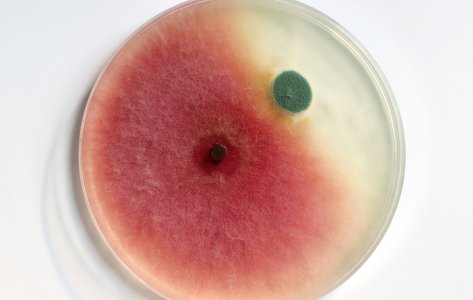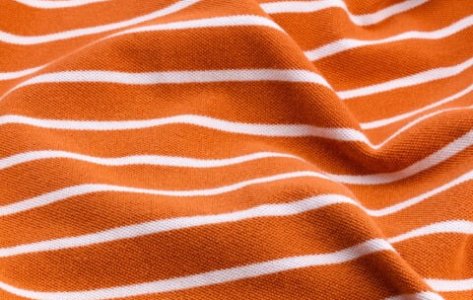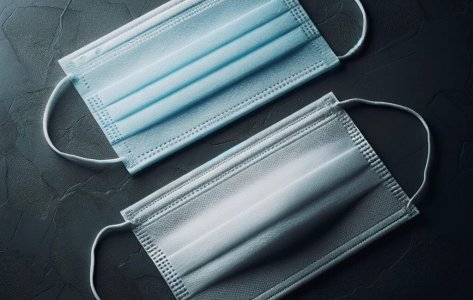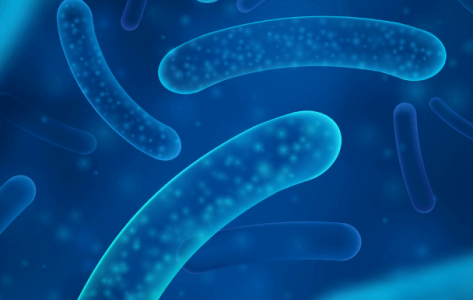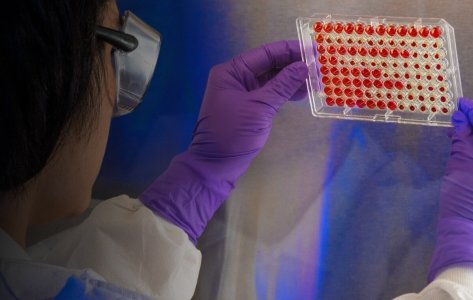- Swiss testing laboratory
EN 1276: 2019

Hassle-free testing experience
Need to get a product tested? No worries! To and fro logistics are on us; we collect your products, test them and, deliver them back to you.
Related tests for you
Quick understanding about test
BS EN 1276: 2019 - Quantitative Suspension Test for the Evaluation of Bactericidal Activity of Chemical Disinfectant
- Enterococcus hirae
- Escherichia coli
- Pseudomonas aeruginosa
- Staphylococcus aureus
- E. faecium
- The test bacterial suspension is mixed with the disinfectant and incubated for the recommended contact time. The mixture is neutralized, plated on agar, and incubated for 20–24 hours. The CFU reduction is calculated to evaluate efficacy.
- Helps meet national and international regulatory standards.
- Provides scientifically backed proof of product efficacy.
- ≥ 5-log reduction for disinfectants.
- ≥ 3-log reduction for handwashes.
Do you have a product that needs testing?
Abstract
Test products
The standard can be used to evaluate a wide range of disinfectant products. Each product is designed for a specific purpose. Some products which may be tested under this standard are as follows:
- Surface disinfectants: These products are intended to clean surfaces in food processing units, kitchens and other public areas.
- Hand sanitizers and washes: These are alcohol-based and non-alcohol-based formulations used for personal hygiene.
- Food industry disinfectants: Disinfectants intended for use on equipment and surfaces to help prevent the spread of food-borne pathogens.
- Household cleaners: Disinfectant products, including multi-purpose and bathroom cleaners for household applications.
- Industrial cleaning agents – Disinfectants used in manufacturing sectors, including pharmaceuticals, cosmetics, and textiles.
EN 1276 test conditions
The test conditions specified by the standard are designed to closely simulate practical use conditions to ensure reliability in results. Some important parameters are
- Test organisms: The bactericidal activity of the product is tested using the following strains: Staphylococcus aureus (ATCC 6538P), Klebsiella pneumoniae (ATCC 4352), Escherichia coli (ATCC 8739), Pseudomonas aeruginosa (ATCC 15442), Enterococcus hirae (ATCC 10541), MRSA (ATCC-33591), Salmonella enterica (ATCC-10708).
- Contact time: The contact time ranges from 1 minute to 60 minutes, depending upon product use and manufacturer’s instructions.
- Test temperature: Test temperature ranges between 4°C – 40°C.
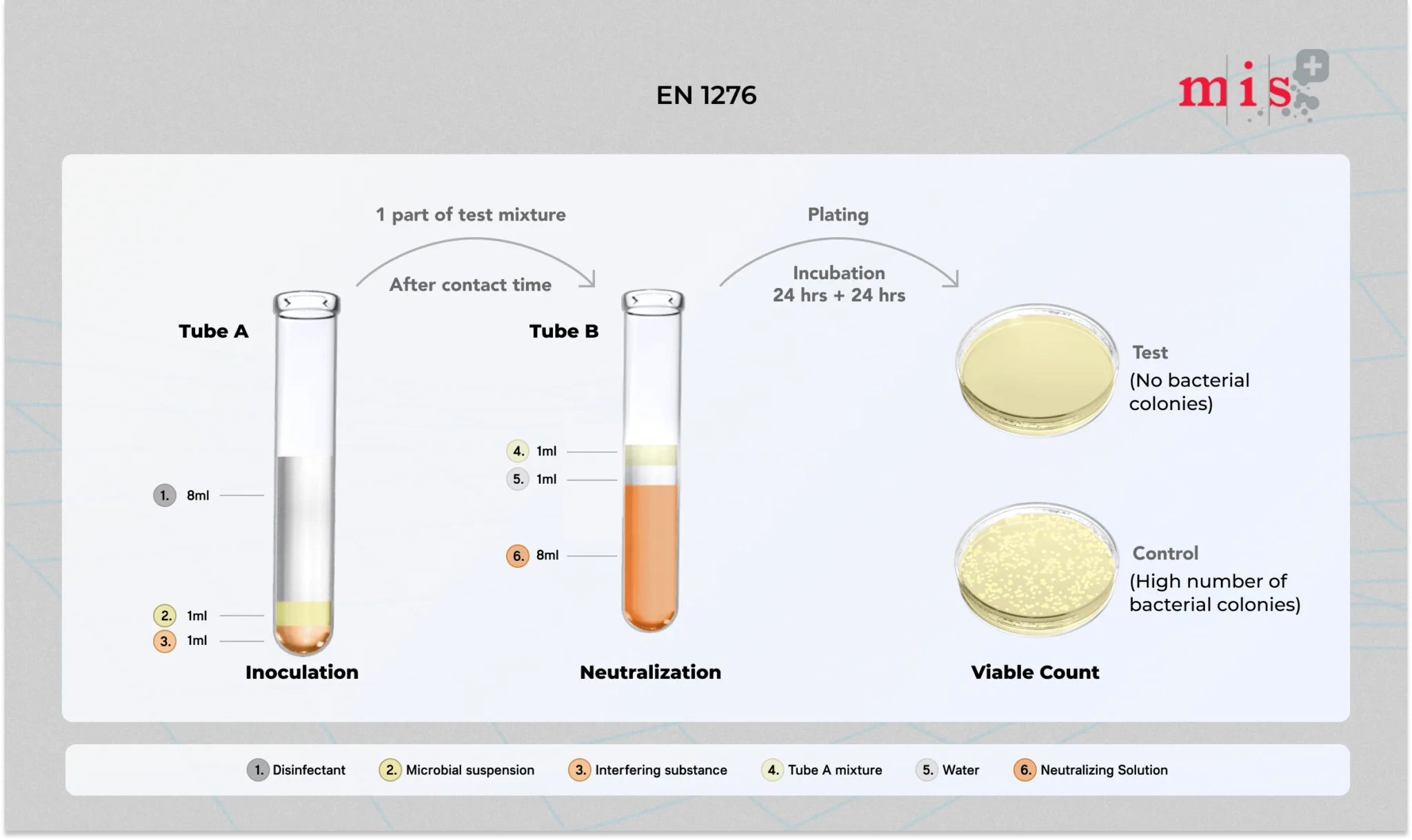
Test requirements for EN 1276
This test procedure consisted of the following steps:
- The test bacterial suspension containing an interfering substance is mixed with the product sample.
- The suspension is incubated at a set temperature for a contact time as recommended by the manufacturer.
- Aliquots of the sample are taken at the end of the contact time and are immediately neutralized by a neutralizing solution to inhibit its bactericidal activity.
- After 5 minutes of neutralization, 1 ml of the test mixture is plated on Tryptone Soya Agar.
- Plates are incubated for 20 – 24 hrs and the reduction in CFU (colony forming units) is calculated.
Procedure for EN 1276 test method
This test procedure consisted of the following steps:
- The test bacterial suspension containing an interfering substance is mixed with the product sample.
- The suspension is incubated at a set temperature for a contact time as recommended by the manufacturer.
- Aliquots of the sample are taken at the end of the contact time and are immediately neutralized by a neutralizing solution to inhibit its bactericidal activity.
- After 5 minutes of neutralization, 1 ml of the test mixture is plated on Tryptone Soya Agar.
- Plates are incubated for 20 – 24 hrs and the reduction in CFU (colony forming units) is calculated.
Log reduction
Products must demonstrate a 5-log reduction to pass the test, except in the case of handwashes, where a log reduction of at least 3 would suffice.
Importance of EN 1276 standard
The standard is of paramount importance to both public safety and product reliability. Testing disinfectants using this standard guarantees consumers that these products can significantly reduce harmful bacteria and prevent the spread of infections in homes, workplaces, and public spaces. The standard thus ensures that the products work as claimed and give the user confidence in their safety and efficacy.
Compliance and industry standard for EN 1276 test
For manufacturers, compliance with the standard is a necessity for market acceptance. By passing the bactericidal efficacy test, manufacturers can justify the claims of their products, making their products more appealing to consumers. Additionally, adhering to this standard’s requirements helps meet national and international regulatory standards, ensuring legal compliance and avoiding potential penalties. This kind of compliance aids good marketability and increases consumer confidence, eventually contributing to business success.
Benefits of EN 1276 standard
There are several benefits to conducting the test, including:
1.Validation of efficacy
Confirms that the disinfectant is effective in real-world conditions.
2. Regulatory compliance
Helps meet national and international regulatory standards.
3.Market trust
Builds consumer confidence by providing scientifically backed proof of efficacy.
4. Versatile applications
Suitable for a wide range of sectors, enhancing product adaptability.
Why Choose Microbe Investigations Switzerland (MIS)
At Microbe Investigations Switzerland (MIS), we understand the importance of reliable and effective disinfection. Our EN-1276 testing services are designed to help manufacturers validate the bactericidal activity of their products, ensuring compliance and building consumer trust.
With state-of-the-art facilities and experienced staff, we offer comprehensive testing solutions that adhere to the highest industry standards. Contact us today to learn more about how we can assist you with your testing needs.
Frequently Asked Questions

DR. Martinoz Scholtz
EN-1276 is a quantitative suspension test for the evaluation of bactericidal activity of disinfectants or antiseptics.
This test method is applicable for chemical disinfectant and antiseptic products such as handrubs and handwashes that have different applications in industrial, institutional areas, etc.
The test method typically needs 4-5 days to complete.
At MIS, we perform this test using Pseudomonas aeruginosa, Escherichia coli, Staphylococcus aureus, Klebsiella pneumoniae, Enterococcus hirae, Enterococcus faecium, Salmonella typhimurium, Lactobacillus brevis, Enterobacter cloacae. Additional strains can be added on request.
The test ensures that chemical disinfectants and antiseptics are effective against common bacteria, providing a standardized way to validate their bactericidal activity. This is crucial for product safety, regulatory compliance, and consumer trust.
To pass the test, a disinfectant must demonstrate a minimum 5-log reduction, meaning it reduces the bacterial population by 99.999%.
The test helps ensure that disinfectant products used in food processing and preparation units are effective at controlling bacteria growth that might cause foodborne infections.
Yes, alcohol-based hand sanitizers can be tested using this standard.
Products should be retested periodically when there are changes in the formulation or production processes or if there are new regulatory requirements.
Meet the best of the blend of
R&D, Efficacy Testing,
Innovation and Passionate
Experts at MIS.





Explore More
Microscopic spores of fungi and
Face masks coated with antibacterial
Introduction The Japanese Industrial Standards
What is ISO 18184 Testing?
